HR Report: Managing People in Organisation - FETes Case Study Analysis
VerifiedAdded on 2023/01/11
|7
|1314
|37
Report
AI Summary
This report, prepared for Fantastic Events & Tents (FETes), analyzes two key HR issues: lack of employee relations and compensation concerns. It delves into these problems, exploring their causes and implications, supported by theories like Vroom's Expectancy Theory and Herzberg's Two-Factor Theory, as well as leadership approaches such as Situational and Contingency models. The report recommends building employee relations through improved communication and task assignments aligned with skills, and implementing performance appraisal systems to address compensation issues. The analysis emphasizes the importance of motivation, leadership, and organizational structure in fostering a positive and productive work environment. The report aims to provide actionable insights for FETes to enhance employee engagement, improve performance, and achieve its organizational goals.
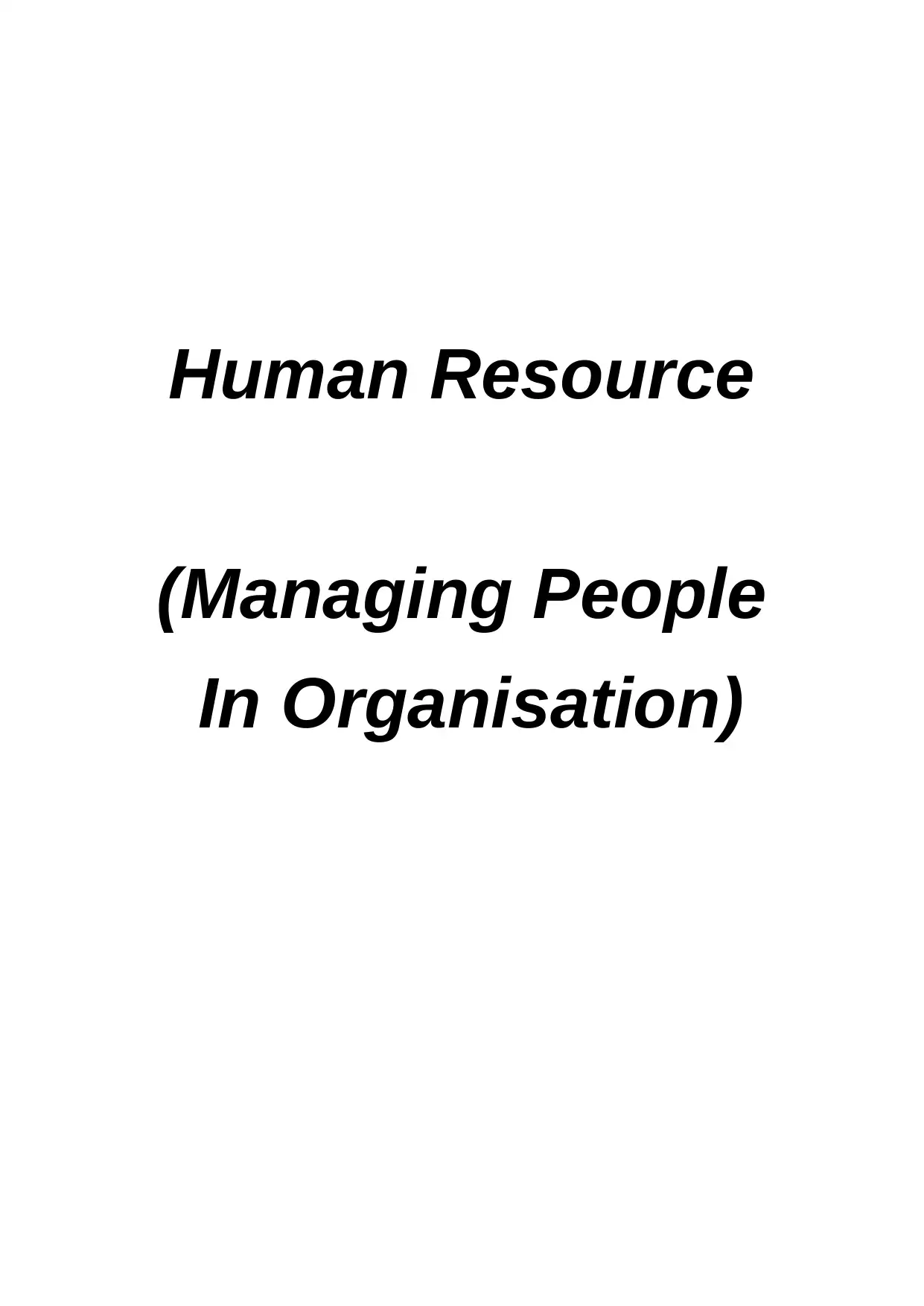
Human Resource
(Managing People
In Organisation)
(Managing People
In Organisation)
Paraphrase This Document
Need a fresh take? Get an instant paraphrase of this document with our AI Paraphraser
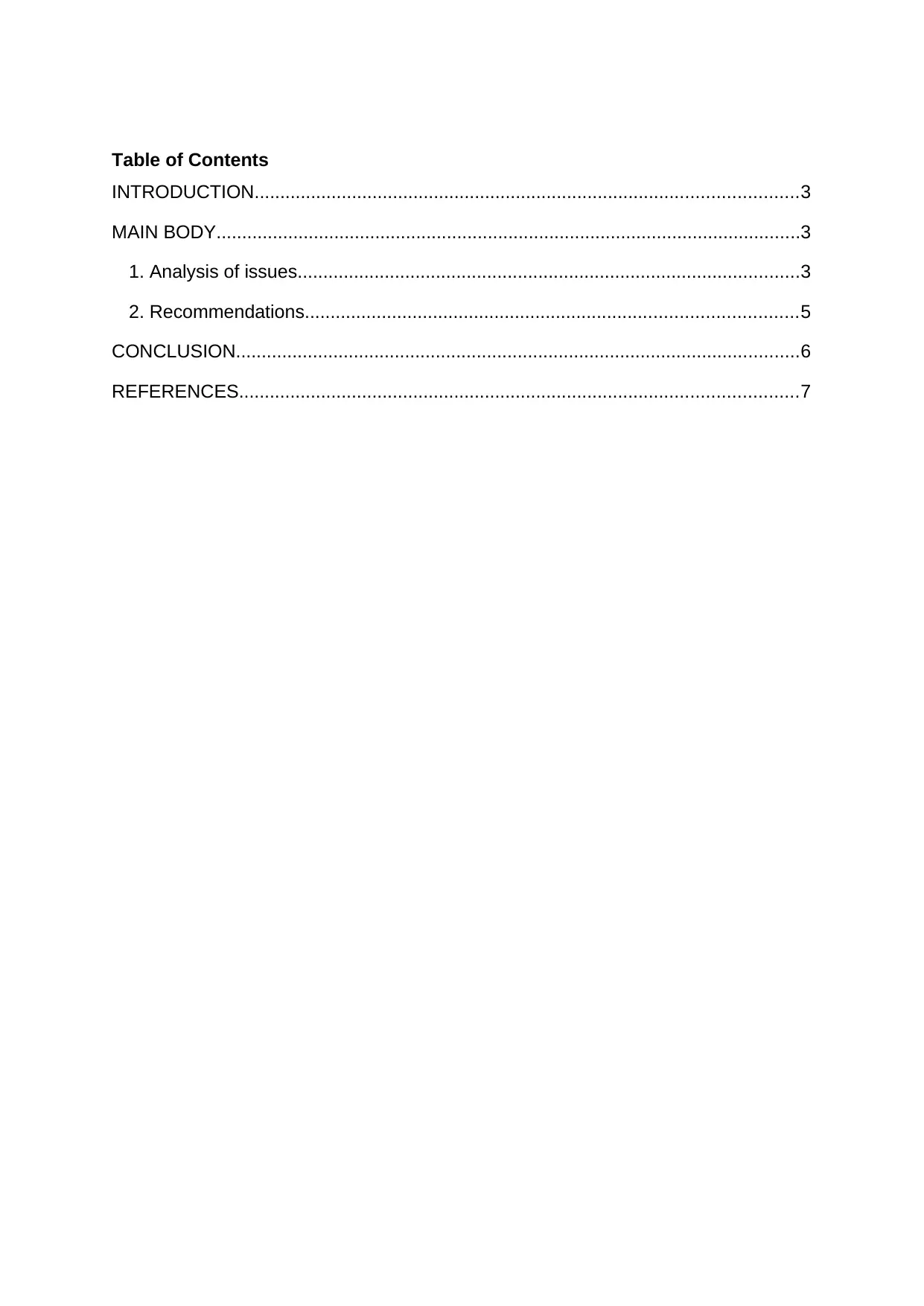
Table of Contents
INTRODUCTION..........................................................................................................3
MAIN BODY..................................................................................................................3
1. Analysis of issues..................................................................................................3
2. Recommendations................................................................................................5
CONCLUSION..............................................................................................................6
REFERENCES.............................................................................................................7
INTRODUCTION..........................................................................................................3
MAIN BODY..................................................................................................................3
1. Analysis of issues..................................................................................................3
2. Recommendations................................................................................................5
CONCLUSION..............................................................................................................6
REFERENCES.............................................................................................................7
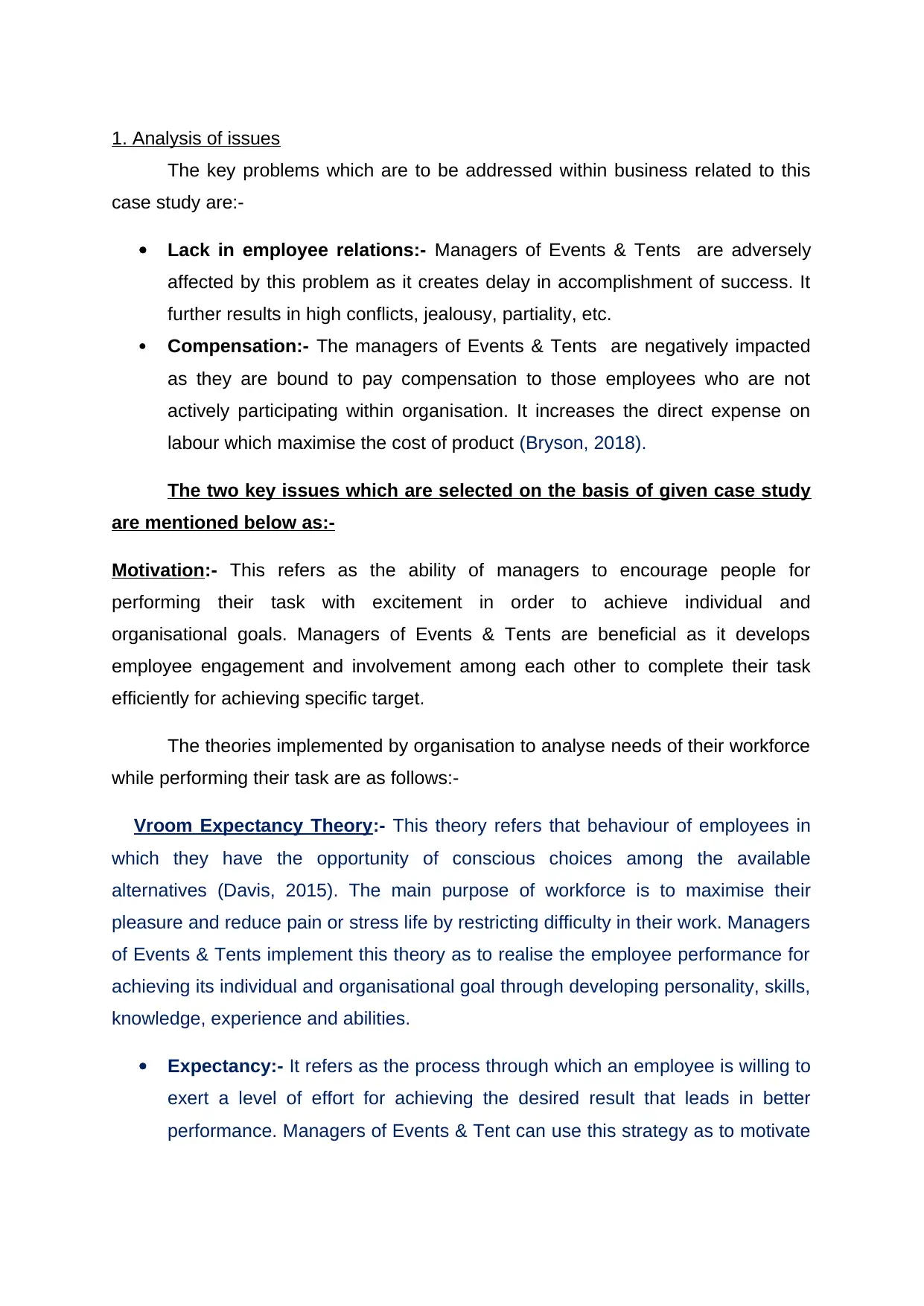
1. Analysis of issues
The key problems which are to be addressed within business related to this
case study are:-
Lack in employee relations:- Managers of Events & Tents are adversely
affected by this problem as it creates delay in accomplishment of success. It
further results in high conflicts, jealousy, partiality, etc.
Compensation:- The managers of Events & Tents are negatively impacted
as they are bound to pay compensation to those employees who are not
actively participating within organisation. It increases the direct expense on
labour which maximise the cost of product (Bryson, 2018).
The two key issues which are selected on the basis of given case study
are mentioned below as:-
Motivation:- This refers as the ability of managers to encourage people for
performing their task with excitement in order to achieve individual and
organisational goals. Managers of Events & Tents are beneficial as it develops
employee engagement and involvement among each other to complete their task
efficiently for achieving specific target.
The theories implemented by organisation to analyse needs of their workforce
while performing their task are as follows:-
Vroom Expectancy Theory:- This theory refers that behaviour of employees in
which they have the opportunity of conscious choices among the available
alternatives (Davis, 2015). The main purpose of workforce is to maximise their
pleasure and reduce pain or stress life by restricting difficulty in their work. Managers
of Events & Tents implement this theory as to realise the employee performance for
achieving its individual and organisational goal through developing personality, skills,
knowledge, experience and abilities.
Expectancy:- It refers as the process through which an employee is willing to
exert a level of effort for achieving the desired result that leads in better
performance. Managers of Events & Tent can use this strategy as to motivate
The key problems which are to be addressed within business related to this
case study are:-
Lack in employee relations:- Managers of Events & Tents are adversely
affected by this problem as it creates delay in accomplishment of success. It
further results in high conflicts, jealousy, partiality, etc.
Compensation:- The managers of Events & Tents are negatively impacted
as they are bound to pay compensation to those employees who are not
actively participating within organisation. It increases the direct expense on
labour which maximise the cost of product (Bryson, 2018).
The two key issues which are selected on the basis of given case study
are mentioned below as:-
Motivation:- This refers as the ability of managers to encourage people for
performing their task with excitement in order to achieve individual and
organisational goals. Managers of Events & Tents are beneficial as it develops
employee engagement and involvement among each other to complete their task
efficiently for achieving specific target.
The theories implemented by organisation to analyse needs of their workforce
while performing their task are as follows:-
Vroom Expectancy Theory:- This theory refers that behaviour of employees in
which they have the opportunity of conscious choices among the available
alternatives (Davis, 2015). The main purpose of workforce is to maximise their
pleasure and reduce pain or stress life by restricting difficulty in their work. Managers
of Events & Tents implement this theory as to realise the employee performance for
achieving its individual and organisational goal through developing personality, skills,
knowledge, experience and abilities.
Expectancy:- It refers as the process through which an employee is willing to
exert a level of effort for achieving the desired result that leads in better
performance. Managers of Events & Tent can use this strategy as to motivate
⊘ This is a preview!⊘
Do you want full access?
Subscribe today to unlock all pages.

Trusted by 1+ million students worldwide
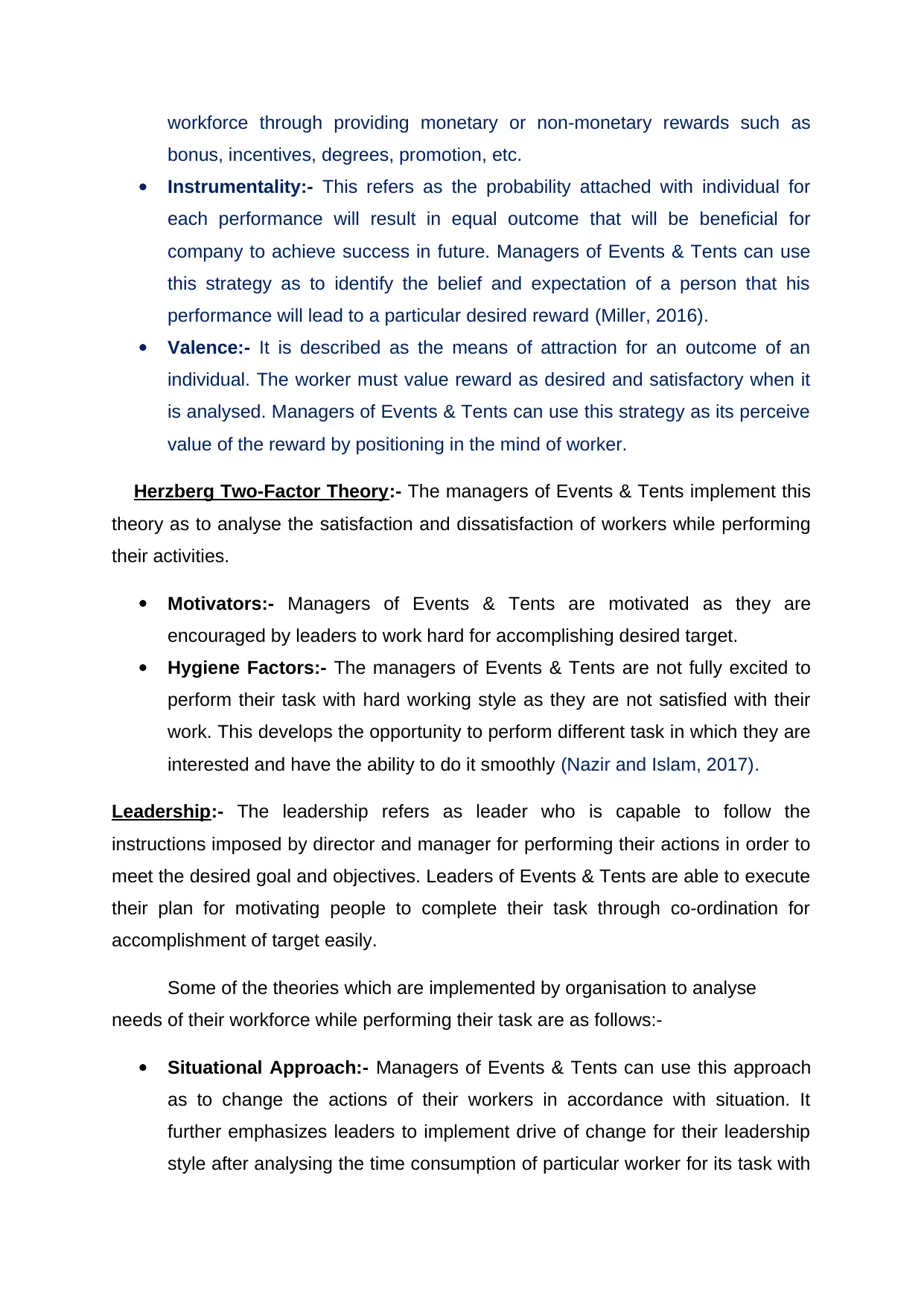
workforce through providing monetary or non-monetary rewards such as
bonus, incentives, degrees, promotion, etc.
Instrumentality:- This refers as the probability attached with individual for
each performance will result in equal outcome that will be beneficial for
company to achieve success in future. Managers of Events & Tents can use
this strategy as to identify the belief and expectation of a person that his
performance will lead to a particular desired reward (Miller, 2016).
Valence:- It is described as the means of attraction for an outcome of an
individual. The worker must value reward as desired and satisfactory when it
is analysed. Managers of Events & Tents can use this strategy as its perceive
value of the reward by positioning in the mind of worker.
Herzberg Two-Factor Theory:- The managers of Events & Tents implement this
theory as to analyse the satisfaction and dissatisfaction of workers while performing
their activities.
Motivators:- Managers of Events & Tents are motivated as they are
encouraged by leaders to work hard for accomplishing desired target.
Hygiene Factors:- The managers of Events & Tents are not fully excited to
perform their task with hard working style as they are not satisfied with their
work. This develops the opportunity to perform different task in which they are
interested and have the ability to do it smoothly (Nazir and Islam, 2017).
Leadership:- The leadership refers as leader who is capable to follow the
instructions imposed by director and manager for performing their actions in order to
meet the desired goal and objectives. Leaders of Events & Tents are able to execute
their plan for motivating people to complete their task through co-ordination for
accomplishment of target easily.
Some of the theories which are implemented by organisation to analyse
needs of their workforce while performing their task are as follows:-
Situational Approach:- Managers of Events & Tents can use this approach
as to change the actions of their workers in accordance with situation. It
further emphasizes leaders to implement drive of change for their leadership
style after analysing the time consumption of particular worker for its task with
bonus, incentives, degrees, promotion, etc.
Instrumentality:- This refers as the probability attached with individual for
each performance will result in equal outcome that will be beneficial for
company to achieve success in future. Managers of Events & Tents can use
this strategy as to identify the belief and expectation of a person that his
performance will lead to a particular desired reward (Miller, 2016).
Valence:- It is described as the means of attraction for an outcome of an
individual. The worker must value reward as desired and satisfactory when it
is analysed. Managers of Events & Tents can use this strategy as its perceive
value of the reward by positioning in the mind of worker.
Herzberg Two-Factor Theory:- The managers of Events & Tents implement this
theory as to analyse the satisfaction and dissatisfaction of workers while performing
their activities.
Motivators:- Managers of Events & Tents are motivated as they are
encouraged by leaders to work hard for accomplishing desired target.
Hygiene Factors:- The managers of Events & Tents are not fully excited to
perform their task with hard working style as they are not satisfied with their
work. This develops the opportunity to perform different task in which they are
interested and have the ability to do it smoothly (Nazir and Islam, 2017).
Leadership:- The leadership refers as leader who is capable to follow the
instructions imposed by director and manager for performing their actions in order to
meet the desired goal and objectives. Leaders of Events & Tents are able to execute
their plan for motivating people to complete their task through co-ordination for
accomplishment of target easily.
Some of the theories which are implemented by organisation to analyse
needs of their workforce while performing their task are as follows:-
Situational Approach:- Managers of Events & Tents can use this approach
as to change the actions of their workers in accordance with situation. It
further emphasizes leaders to implement drive of change for their leadership
style after analysing the time consumption of particular worker for its task with
Paraphrase This Document
Need a fresh take? Get an instant paraphrase of this document with our AI Paraphraser
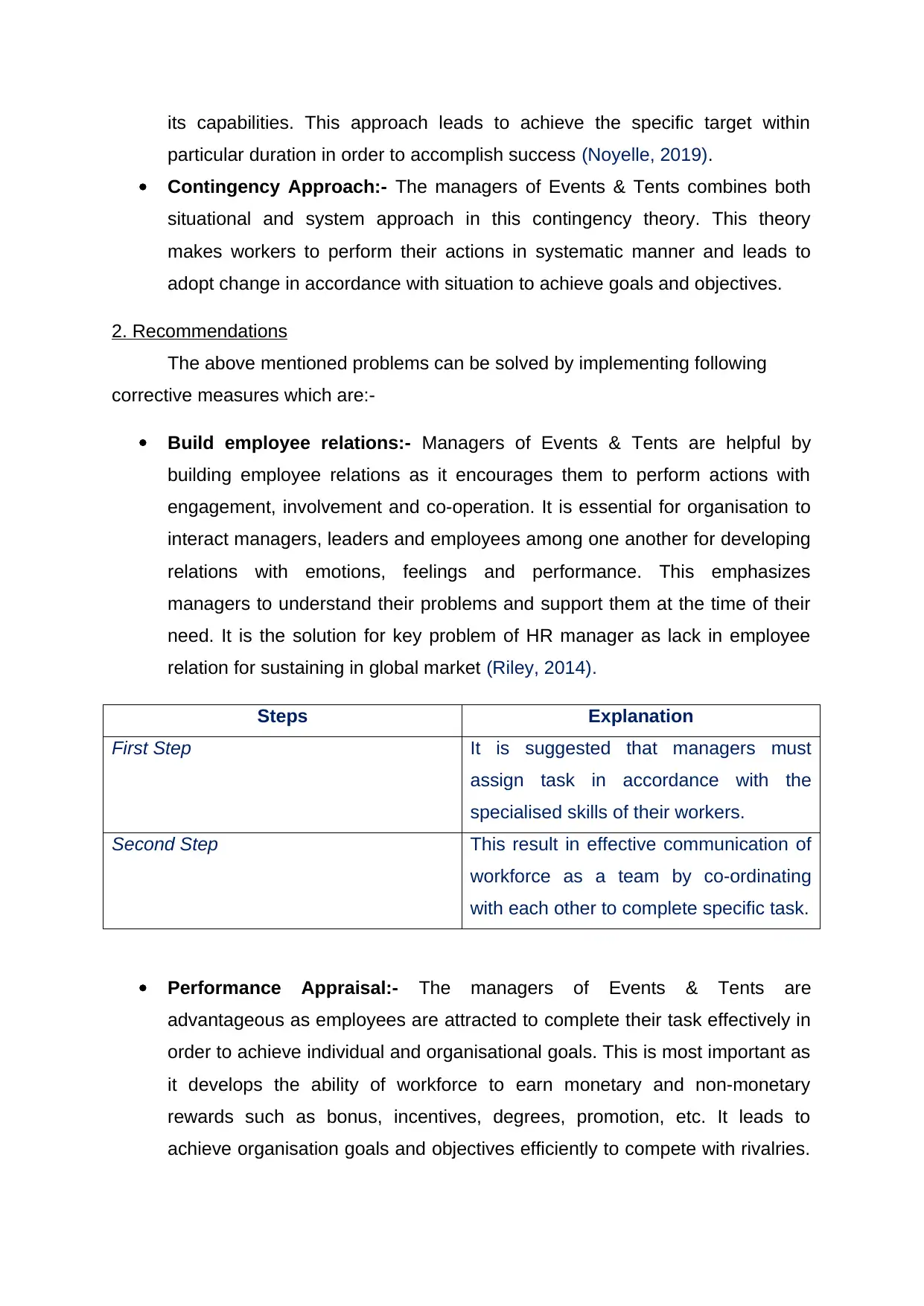
its capabilities. This approach leads to achieve the specific target within
particular duration in order to accomplish success (Noyelle, 2019).
Contingency Approach:- The managers of Events & Tents combines both
situational and system approach in this contingency theory. This theory
makes workers to perform their actions in systematic manner and leads to
adopt change in accordance with situation to achieve goals and objectives.
2. Recommendations
The above mentioned problems can be solved by implementing following
corrective measures which are:-
Build employee relations:- Managers of Events & Tents are helpful by
building employee relations as it encourages them to perform actions with
engagement, involvement and co-operation. It is essential for organisation to
interact managers, leaders and employees among one another for developing
relations with emotions, feelings and performance. This emphasizes
managers to understand their problems and support them at the time of their
need. It is the solution for key problem of HR manager as lack in employee
relation for sustaining in global market (Riley, 2014).
Steps Explanation
First Step It is suggested that managers must
assign task in accordance with the
specialised skills of their workers.
Second Step This result in effective communication of
workforce as a team by co-ordinating
with each other to complete specific task.
Performance Appraisal:- The managers of Events & Tents are
advantageous as employees are attracted to complete their task effectively in
order to achieve individual and organisational goals. This is most important as
it develops the ability of workforce to earn monetary and non-monetary
rewards such as bonus, incentives, degrees, promotion, etc. It leads to
achieve organisation goals and objectives efficiently to compete with rivalries.
particular duration in order to accomplish success (Noyelle, 2019).
Contingency Approach:- The managers of Events & Tents combines both
situational and system approach in this contingency theory. This theory
makes workers to perform their actions in systematic manner and leads to
adopt change in accordance with situation to achieve goals and objectives.
2. Recommendations
The above mentioned problems can be solved by implementing following
corrective measures which are:-
Build employee relations:- Managers of Events & Tents are helpful by
building employee relations as it encourages them to perform actions with
engagement, involvement and co-operation. It is essential for organisation to
interact managers, leaders and employees among one another for developing
relations with emotions, feelings and performance. This emphasizes
managers to understand their problems and support them at the time of their
need. It is the solution for key problem of HR manager as lack in employee
relation for sustaining in global market (Riley, 2014).
Steps Explanation
First Step It is suggested that managers must
assign task in accordance with the
specialised skills of their workers.
Second Step This result in effective communication of
workforce as a team by co-ordinating
with each other to complete specific task.
Performance Appraisal:- The managers of Events & Tents are
advantageous as employees are attracted to complete their task effectively in
order to achieve individual and organisational goals. This is most important as
it develops the ability of workforce to earn monetary and non-monetary
rewards such as bonus, incentives, degrees, promotion, etc. It leads to
achieve organisation goals and objectives efficiently to compete with rivalries.
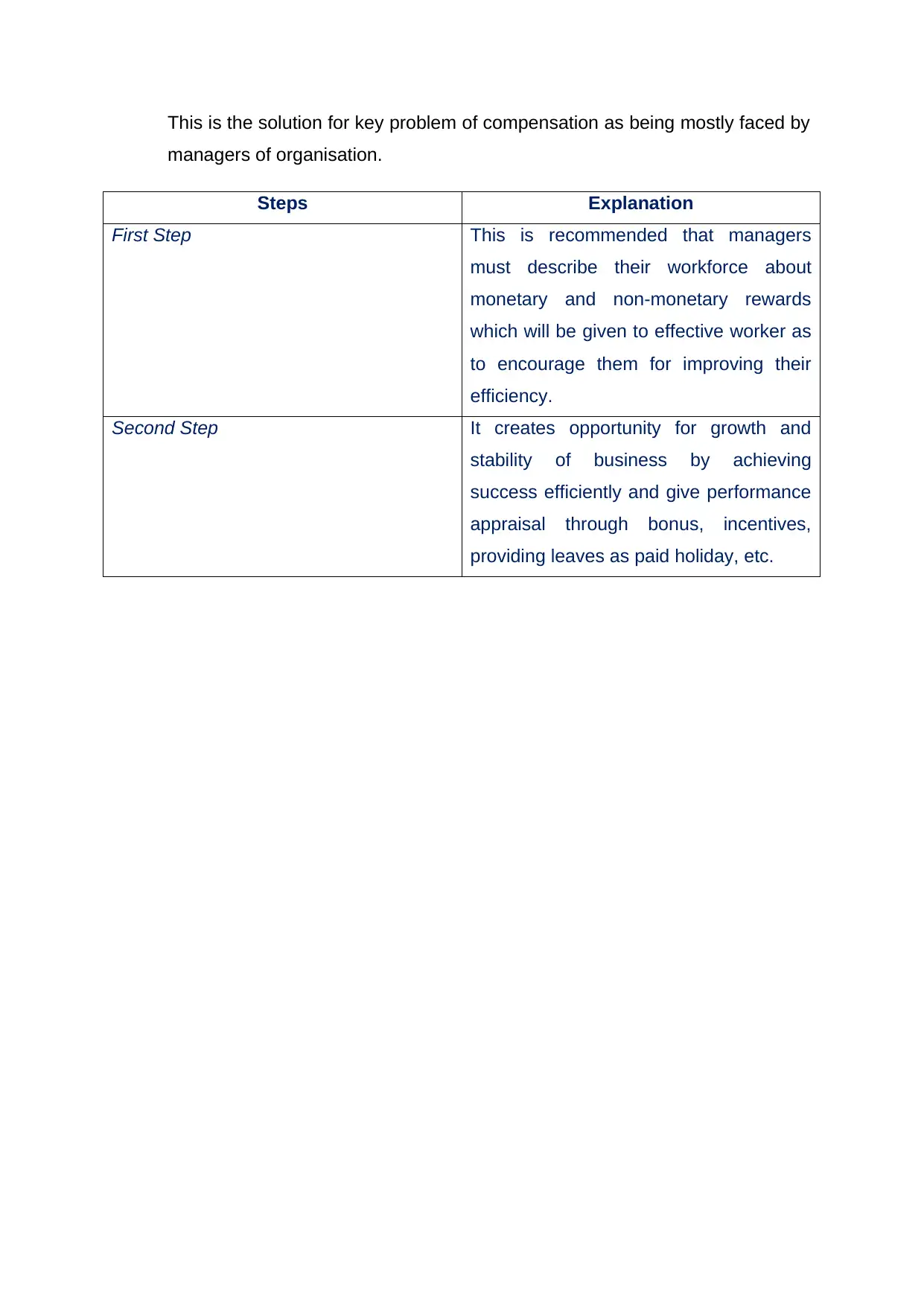
This is the solution for key problem of compensation as being mostly faced by
managers of organisation.
Steps Explanation
First Step This is recommended that managers
must describe their workforce about
monetary and non-monetary rewards
which will be given to effective worker as
to encourage them for improving their
efficiency.
Second Step It creates opportunity for growth and
stability of business by achieving
success efficiently and give performance
appraisal through bonus, incentives,
providing leaves as paid holiday, etc.
managers of organisation.
Steps Explanation
First Step This is recommended that managers
must describe their workforce about
monetary and non-monetary rewards
which will be given to effective worker as
to encourage them for improving their
efficiency.
Second Step It creates opportunity for growth and
stability of business by achieving
success efficiently and give performance
appraisal through bonus, incentives,
providing leaves as paid holiday, etc.
⊘ This is a preview!⊘
Do you want full access?
Subscribe today to unlock all pages.

Trusted by 1+ million students worldwide
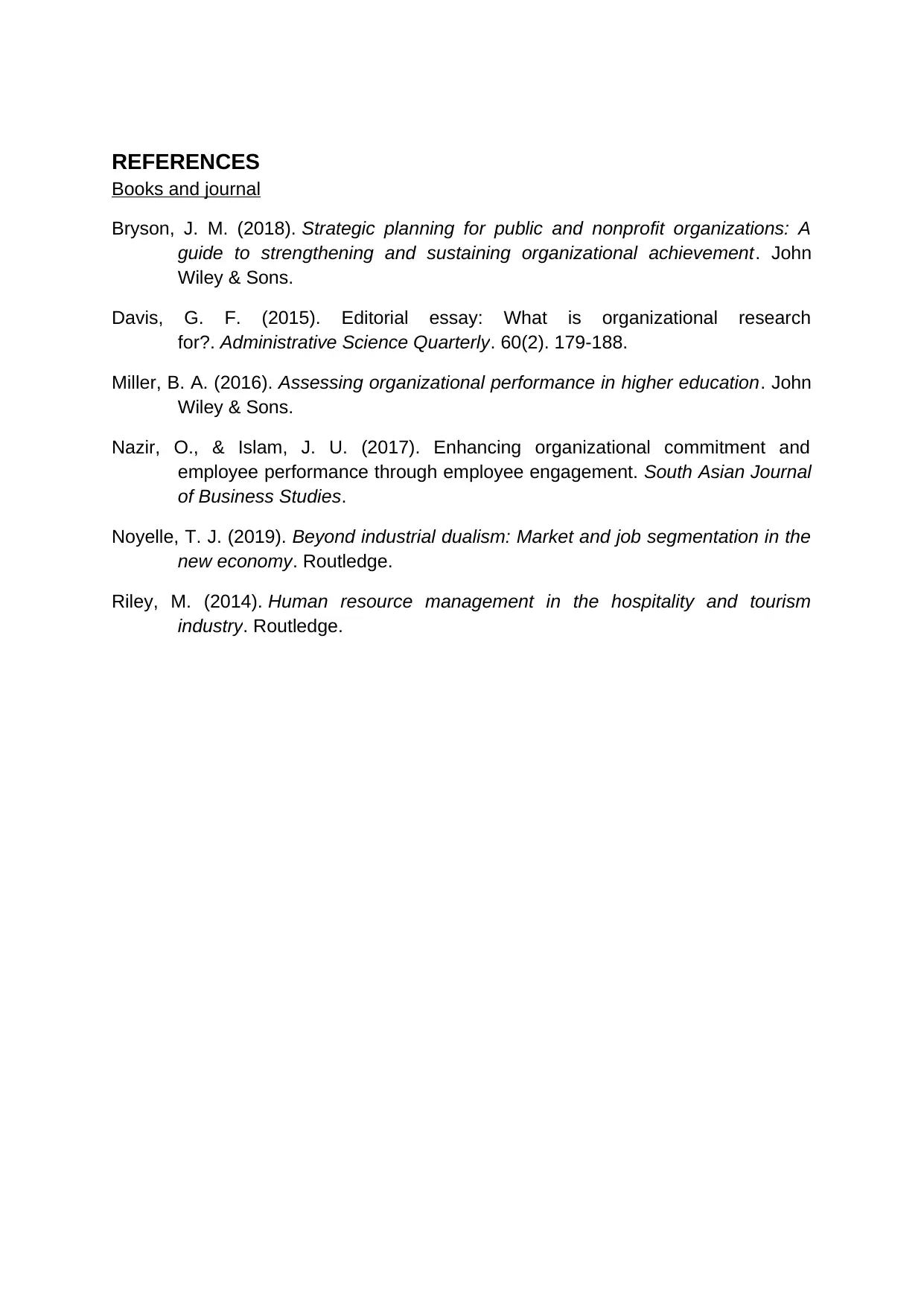
REFERENCES
Books and journal
Bryson, J. M. (2018). Strategic planning for public and nonprofit organizations: A
guide to strengthening and sustaining organizational achievement. John
Wiley & Sons.
Davis, G. F. (2015). Editorial essay: What is organizational research
for?. Administrative Science Quarterly. 60(2). 179-188.
Miller, B. A. (2016). Assessing organizational performance in higher education. John
Wiley & Sons.
Nazir, O., & Islam, J. U. (2017). Enhancing organizational commitment and
employee performance through employee engagement. South Asian Journal
of Business Studies.
Noyelle, T. J. (2019). Beyond industrial dualism: Market and job segmentation in the
new economy. Routledge.
Riley, M. (2014). Human resource management in the hospitality and tourism
industry. Routledge.
Books and journal
Bryson, J. M. (2018). Strategic planning for public and nonprofit organizations: A
guide to strengthening and sustaining organizational achievement. John
Wiley & Sons.
Davis, G. F. (2015). Editorial essay: What is organizational research
for?. Administrative Science Quarterly. 60(2). 179-188.
Miller, B. A. (2016). Assessing organizational performance in higher education. John
Wiley & Sons.
Nazir, O., & Islam, J. U. (2017). Enhancing organizational commitment and
employee performance through employee engagement. South Asian Journal
of Business Studies.
Noyelle, T. J. (2019). Beyond industrial dualism: Market and job segmentation in the
new economy. Routledge.
Riley, M. (2014). Human resource management in the hospitality and tourism
industry. Routledge.
1 out of 7
Related Documents
Your All-in-One AI-Powered Toolkit for Academic Success.
+13062052269
info@desklib.com
Available 24*7 on WhatsApp / Email
![[object Object]](/_next/static/media/star-bottom.7253800d.svg)
Unlock your academic potential
Copyright © 2020–2026 A2Z Services. All Rights Reserved. Developed and managed by ZUCOL.





